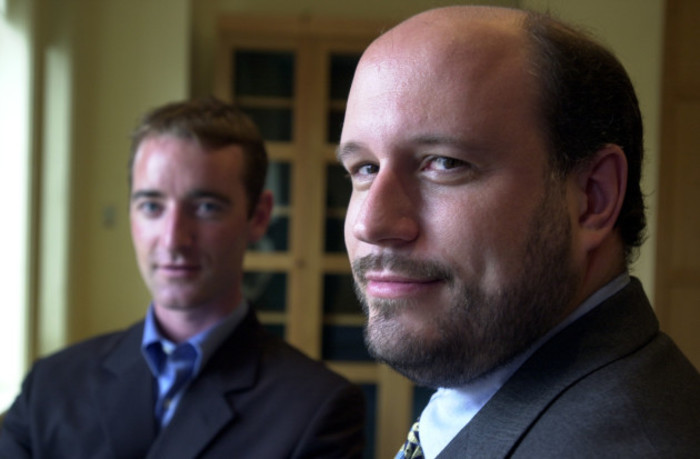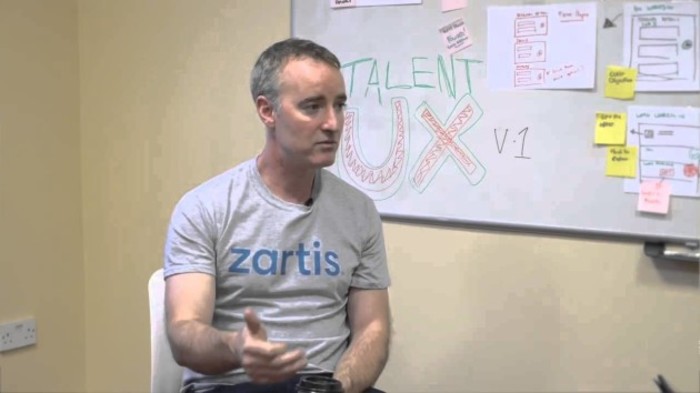'If I could go back in time and tell myself not to sell, I would'
The founder of Zartis rode the crest of the dot-com wave – and fell hard when the swell broke.
WHEN THE DOT-COM bubble burst, I was in the thick of it. I had built a business from nothing to be an $18 million company within a year and then nearly in an instant it was all gone.
In the late 1990s, I came back to Ireland from living in South Africa. I remember I went to a recruitment agency and the recruiter asked what I want to work in. I mentioned an interest in doing web development and she turned to me and said, “That’s a hobby not a career”.
It’s hard to imagine now, but back then some people in the world were still thinking the internet thing wasn’t going to really catch on. To me it was obvious – the whole thing had already taken off and was a massive opportunity.
Eventually I got on board with a startup called Ebeon. After that was eventually sold to Eircom, I left the company to set up Zartis with five other people in September 1999.
We raised £100,000 between us, we got an office out in City West and started providing consulting services to companies about how they can get on the internet.
We did front end, back end and then we helped host the application. We were providing the entire service from design to launch of a web application.
 John Dennehy (left) with Bill Loftus, vice-president of operations at Breakaway Solutions
John Dennehy (left) with Bill Loftus, vice-president of operations at Breakaway Solutions
Dot-com mania
Zartis grew to be a 40-person operation between September and July and we were on track for turnover of about £1 million. Then we were approached by a company called Breakaway Solutions.
They were a US company listed on the Nasdaq, with a market capital of about $2 billion. We were just some people in our 20s who had put £100,000 into a company.
We had no external shareholders or external investors and now somebody was offering to buy our company after nine months. We had just created capital value of effectively $2 million a month.
Breakaway Solutions flew a team over and told us they wanted to buy a company in Europe to grow their business out of America into Europe. So we went through a negotiation process over a number of weeks which resulted in an acquisition price of $18 million being agreed.
We signed an agreement in July 2000 for Breakaway Solutions to acquire all the shareholding in Zartis and then we became part of the company.
Hit the fan
Soon after we had signed the deal, the dot-com crash happened very quickly. It was like a trapdoor opening. We had gotten some cash out, about a million pounds, but the rest of the consideration was in shares and cash that we would get access to in 12 months’ time.
Basically from July 2000 to July 2001, the whole internet thing had collapsed. The parent company that had bought Zartis was going broke and they were taken off the stock market. So 12 months later we weren’t even able to cash in our shares and had serious trouble getting the cash that they actually owed us.
The parent company ended up having to wind down, which meant I had to do the same for the entity in Ireland.
So that was it. We went from making millions and being on the front page of the Irish Times to a year later being back in the papers, but this time they were saying, “John Dennehy loses everything”.
It was a roller-coaster ride. We had been taken up very quickly on a high and slammed back down again. We got out with the shirts on our backs and all we could do was dust off our jackets and go again.

Hindsight
It’s a tough learning experience. I remember when the company came to buy us and it said we were going to learn a lot from them. And we certainly did, it just wasn’t the way we expected it.
At the time, you think you’re the only person in the world and it’s easy to feel like no one else has ever been in that position. But in reality, everyone goes through tough times in business.
It’s very hard to look back and say you would have done something differently. Nobody saw the internet gold rush collapsing as quickly as it did. I think things that grow very quickly can often be taken away in a flash.
If you look at successful businesses, they can appear overnight successes, but only after five to ten years of hard work. Whereas if there is a more measured approach and a business is growing and profitable, they tend to have long-term value.
Exiting too early was a problem and I think we sold the company too early. I think if we had stayed focused on building the company and not on an exit it might be a different story.
Great companies were started during the dot-com craziness and those companies grew through surviving the collapse. Google started around the same time as Zartis, but Google obviously weathered the storm.

Being distracted by an exit too early in a company’s life cycle is a very dangerous thing. You also have no control. If you decide you’re selling a company and go into that process, it typically takes at least three to six months to actually sell the company.
During that time, the CEO is spending time with lawyers and corporate finance guys and it’s hugely distracting. The management guys are also focused on the sale as opposed to building the business. I think that can also happen if a company is raising venture capital as well and there is a heavy price to pay for that.
If I could go back in time and tell myself not to sell, I would. It takes years to build a good company and trying to sell the company within a year is very hard.
I set up the current business I’m working on in 2009 and now seven years later I feel like we’re only getting started. We have two divisions. Hirehive.io, which is an online recruitment platform for growing SMEs globally, and Zartis, which is now an IT recruitment services company.
I know what I’m doing now. We’re focused on building a business. I’m not thinking about investors or exits, we’re 100% focused on customers and being profitable.
We live every month from the funds that come from our customers, which I think is an honest way to do business.
John Dennehy is the CEO of HireHive.io and Zartis. This article was written in conversation with Killian Woods as part of a series on business mistakes and what can be learned from them.
If you want to share your opinion, advice or story, email opinion@fora.ie.






